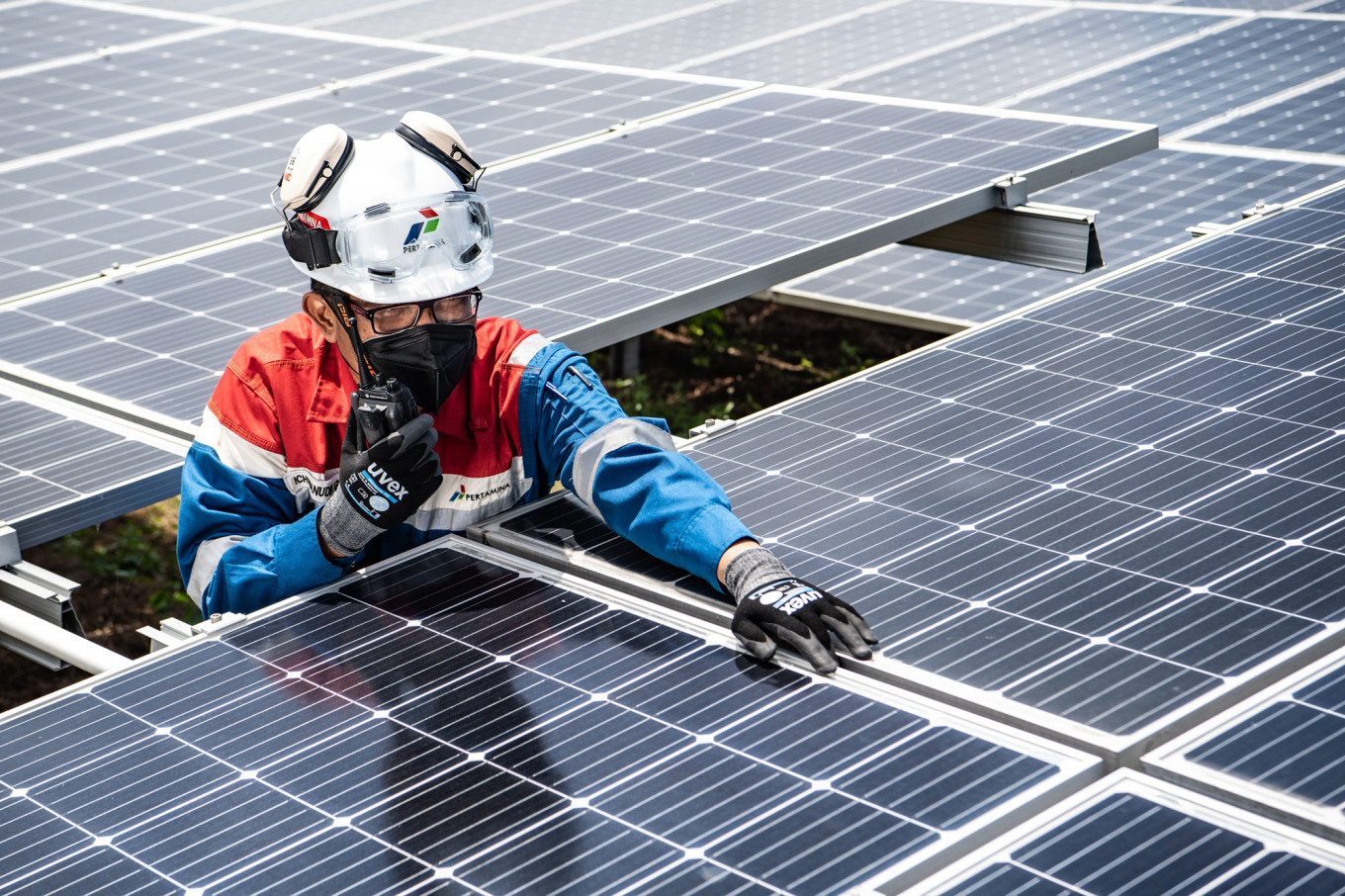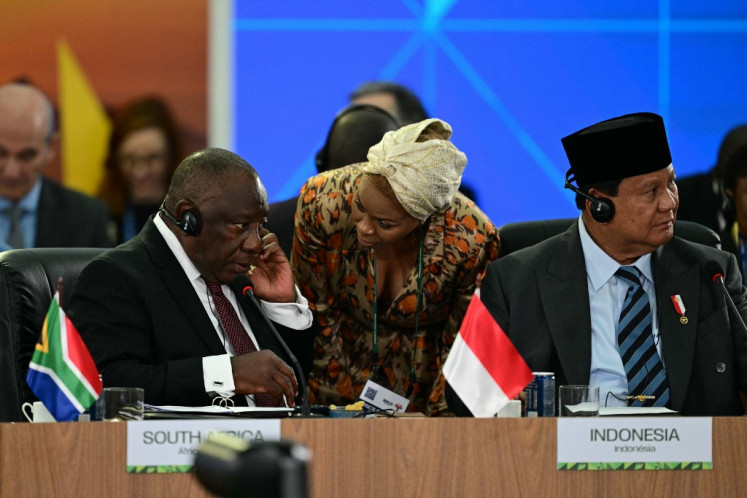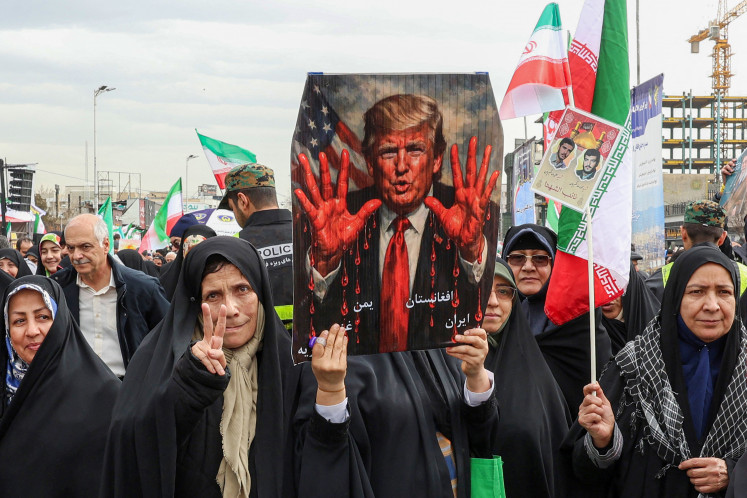Popular Reads
Top Results
Can't find what you're looking for?
View all search resultsPopular Reads
Top Results
Can't find what you're looking for?
View all search resultsRenewable energy bill: An ambitious attempt at energy transition
Supporting state-owned power companies in purchasing green energy is especially relevant because Indonesia’s green energy prices are around 10 percent to 65 percent higher than other Asian countries.
Change text size
Gift Premium Articles
to Anyone

The Indonesian government is preparing to pass a new energy and renewable energy bill known officially as Rancangan Undang Undang tentang Energi Baru dan Terbarukan or RUU EBT. This is a regulatory framework for renewable energy projects and incentivises the transition to green energy. While better late than never, RUU EBT has some shortcomings and missed opportunities.
During COP21 in 2015 in Paris, the Indonesian government set policy targets to increase the use of alternative energy sources. As of 2021, Indonesia’s renewable energy generation capacity stands at 11.4 percent and is still far behind the mandated minimum target of 23 percent by 2025, notwithstanding that Indonesia is on the front line of climate change. This also has to be seen in light of recent events, where the European Union (EU) and several Group of 20 governments signed a non-binding declaration at the Nov. 15 G20 summit pledging up to US$20 billion to help Indonesia phase out coal-fired power plants (CFPPs) and achieve net zero emissions in the power sector by 2050. This supports the newly enacted Presidential Regulation 112/2022, which mandates the development of a roadmap to retire CFPPs earlier.
Indonesia has made green energy one of the key pillars of its 2022 G20 presidency and it is apt that Indonesia walks the talk by passing RUU EBT. This would be a milestone in Indonesia’s path toward green energy and would also underscore its commitment to net zero emissions.
Policy guidance and funding are crucial in developing Indonesia’s green energy potential, with Indonesia estimated to require $200 billion yearly to reach net zero. In the latest draft of the RUU EBT, dated May 30, 2022, the Indonesian government introduces a broad range of measures, such as dedicating funds to achieve green energy targets, creating an ecosystem for green energy research and education, and supporting state-owned power companies in purchasing green energy, and tax incentives for businesses that are part of the green energy sector.
Supporting state-owned power companies in purchasing green energy is especially relevant because Indonesia’s green energy prices are around 10 percent to 65 percent higher than other Asian countries. Consumers will benefit from lower prices for green energy and be more inclined to move away from (cheaper) fossil fuels.
Another barrier to the adoption of green energy is the critical shortage of skilled personnel in Indonesia for green energy projects. Supporting research and education will certainly encourage more companies to invest in Indonesia and in turn create more training and job opportunities, bringing tangible socio-economic benefits to communities.
Although RUU EBT is ambitious and forward-looking, it is still lacking in some areas. While Article 59 of RUU EBT recognizes public involvement in Indonesia's green energy transition, it is unclear how this will be implemented. Since the energy sector is dominated by large companies, a more robust legal framework is needed to give the public an effective voice. RUU EBT itself is not enough to facilitate Indonesia’s green energy transition holistically and constructively.
It is unclear how red tape will be reduced. Red tape such as overlapping regulations at the regional level and at ministries amounts to nearly 40 percent of Indonesia’s green energy costs, resulting in multiple permits being required for each activity. For example, geothermal projects in protected forest areas require a permit from the Ministry of Forestry and Environment, as well as an electricity business license, environmental permit and location permit. The cost of red tape is significant, estimated at 40 percent of Indonesia’s current green energy costs. Indonesia should draw inspiration from commitments by Vietnam to halve business and investment conditions and Thailand to restructure its administrative bodies, which helped Vietnam and Thailand become the top 10 producers of solar photovoltaic modules worldwide.
The definition of new energy sources also appears to conflict with the objective and spirit of the bill. While RUU EBT aims to transition away from all diesel-fuelled power plants by 2024, Article 6 of RUU EBT allows transition not only to renewable energy but also to “new energy”, which includes coal-derived products with relatively high carbon emissions like liquefied coal and gasified coal.
As a result, there will be less incentive to phase out polluting technologies given that coal-fuelled companies are eligible to receive incentives from RUU EBT. Such a compromise kicks the proverbial can down the road for green energy in contrast to the efforts of other countries to differentiate the carbon emissions of different energy sources. RUU EBT should introduce a standardized tiered incentive system so that coal companies receive less incentives and are encouraged to move away from coal. One might argue that "renewable energy sources" (under Article 30 of RUU EBT) should receive more funding than "new energy sources" since "renewable energy sources", such as wind and solar energy, have significantly lower carbon emissions.
RUU EBT is also a missed opportunity for Indonesia to lead Southeast Asia’s green energy evolution. Article 23 of RUU EBT paradoxically imposes export levies on green energy, which will put off investors who might otherwise export green energy outside Indonesia if not for these restrictions. The levies put green energy at a comparative disadvantage to its conventional energy counterparts which, under the current regulations, receive much more fiscal incentives.
In the current climate of volatile oil prices, there is no better time to gain a foothold in the green energy sector. Southeast Asia is especially vulnerable as an aggregate oil importer and green energy can reduce exposure to volatile prices. Green energy exports can help mould Indonesia into a major green energy player in Southeast Asia, just like how Australia is projected to achieve annual exports worth A$1 billion (US$670 million) from the proposed Australia-Asia Power Link. Furthermore, a competitive export market brings lower domestic green energy prices for Indonesians.
RUU EBT is an important step in Indonesia’s transition to green energy. While RUU EBT provides sorely needed support for the green energy transition, lawmakers should reconsider the imposing of export levies and the inclusion of relatively dirty sources of energy. The exclusion of coal derivatives and other carbon-intensive energy sources from RUU EBT would also be consistent with other efforts to curb pollution from the energy sector.
This aligns with the recent pledge by the EU and several G20 governments to help Indonesia phase out CFPPs and achieve net zero emissions by 2050. Together with other ministerial regulations, these changes will future-proof the legislation and unlock growth opportunities for Indonesia’s green energy sector.
***
Kohe Hasan is a partner at the Singapore office of international law firm Reed Smith and Denny Rahmansyah is a partner at the Indonesian law firm SSEK Legal Consultants.











